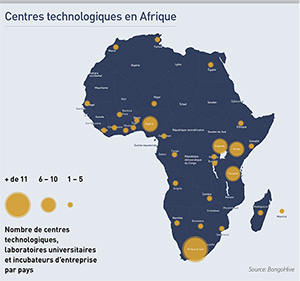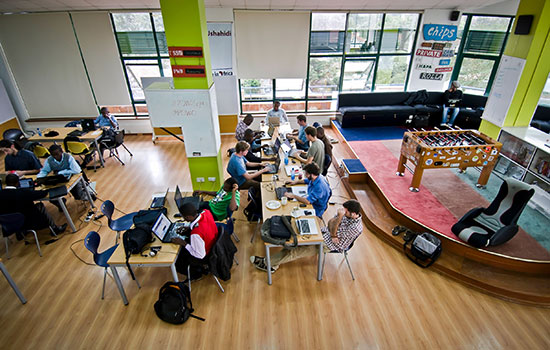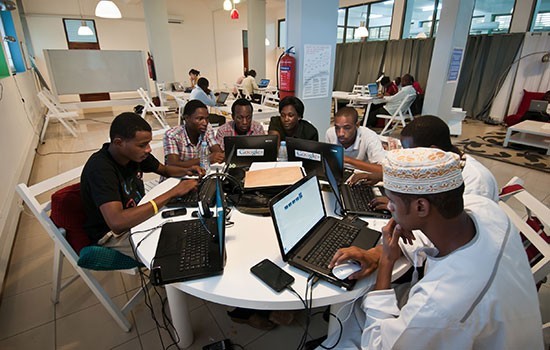For millions of unemployed and tech-savvy young Africans, Africa’s digital revolution presents enormous opportunities. Information and communication technologies (ICTs) enable young entrepreneurs to create a better future.
Under a tin roof, in the sweltering heat of a tiny shack in a bullet-riddled neighborhood in Mogadishu, two brothers, Ali Hassan and Mustafa Yare, lean over one of their eight desktops. Together, they explain to Nasteexo Cadey, a young student at the University of Mogadishu, how to create a Facebook account, watch videos on YouTube and read her email.
Like some other makeshift Internet cafes created since the flight of al-Shabaab Islamist militias, the Yare brothers have seen their clientele increase in recent months.
“I wanted to have my own business,” says Hassan. “IT and information technology, I know. I have skills. Given the high unemployment, any job is a boon. The operating costs of the café are $ 600 per month and the approximately 40 daily customers, mostly students, earn around $ 1,000 a month.
Even though the Internet penetration rate in Somalia is just over 1% of the population, a figure comparable to that of Afghanistan, demand in Mogadishu is rising sharply, thanks, as in the rest of Africa, to the thirst for technology of young people.
Better opportunities
“ICTs offer tremendous opportunities” to African youth, says Ahmed Alfi, managing director of Sawari Ventures, an Egyptian venture capital firm focused on new technologies. “Software development is the only sector where a thousand dollar investment can bring in a million. ”
And even if an Internet café does not bring in a million dollars, what is created can be very lucrative. Over the last five years, the installation of fiber optic cables and infrastructure has enabled an unprecedented degree of connection to the African continent. Internet access costs have dropped and new markets have opened up for content, software, mobile applications and social networks. From Somalia to Ghana, from Dar es Salaam to Dakar to Cape Town to Cairo, African youth are using ICTs to spur growth, create businesses and forge a future.
The rise of the mobile market
Africa has six of the world’s ten fastest growing economies. It is the world’s second largest market for mobile phones – “smartphones” are selling four times more than computers. According to the ICTworks blog, between August 2011 and February 2012 the number of Facebook users in Africa grew by 165%.
“In 2016, Africa is expected to have one billion mobile phones,” Mark Casey, director of technology, media and telecommunications at Deloitte, a financial consulting firm, said in a recent report. “Mobile phone use in Africa is one of the most developed in the world. Important possibilities exist to use social networks for commercial purposes. ”
Technological boom in Ghana
Five years ago, BusyInternet, the largest provider in West Africa, opened an Internet café in Accra, Ghana’s capital. In a room with a hundred computers, Ghanaians from all walks of life could use a high-speed connection for fifty cents an hour. With Internet penetration at around 10% in 2011, BusyInternet was one of the few places where young people could connect.
Mac-Jordan Degadjor, 26, is a well-known blogger in Ghana who specializes in social networking and technology. He is the first Ghanaian to be named Internet Freedom Fellow, a prize awarded by the US State Department to individuals who have defended freedom of expression and online meeting. Mac-Jordan Degadjor recalls the revolutionary effect of BusyInternet in the high-tech sector. “It opened many doors for young people living in Ghana,” he says.
Many young entrepreneurs and bloggers have used this space to gain new knowledge – online or together – and form a high-tech community. They ran BarCamps (informal meetings of computer enthusiasts) and created BloggingGhana, a network of bloggers.
According to the US Embassy in Accra, which awarded the prize to Degadjor, these initiatives “encouraged young people to connect as soon as they could, allowing them to connect with other Ghanaians who were able to help them overcome technical difficulties. ”
As early as 2008, it became apparent that the young high-tech community in Accra needed institutional support. The Meltwater Entrepreneurial School of Technology (MEST), a school offering future entrepreneurs and software developers training and tutoring over two years, was created. Several successful companies have emerged from this initiative, such as NandiMobile, which provides local businesses with mobile marketing and customer consulting services. Almost all MEST entrepreneurs are around 25 years old.
This young generation has not only given birth to companies. @GhanaDecides, a movement that monitors elections in Ghana through social media, distinguished itself by its outreach to voters during the pre-election period in 2012. While advocating free and fair elections, the movement launched several campaigns on electoral issues and offered young people, civil society organizations and public institutions online training on social networks.
Technology Centers
The catalytic role of BusyInternet is not an isolated case. Elsewhere in Africa, technology centers are also promoting the work of young developers and entrepreneurs.

Erik Hersman is co-founder of Ushahidi and Nairobi’s iHub – one of the continent’s best-known centers. According to him, Africa is currently experiencing a boom in this area. There are now more than 90 such centers or laboratories, incubators and accelerators in at least twenty countries. According to a recent study, a center of this type or so is born every two weeks in Africa.
“African technology centers welcome those who have new ideas, inspire them to innovate and allow them to make contacts and progress together,” says Erik Hersman.
iHub was born out of the success of Ushahidi’s software platform, which was used to capture and track information provided by citizens during the 2008 post-election violence in Kenya. Launched in 2010, iHub has more than 8,000 members around the world and dozens of people use space on a regular basis.
Nearly 75% of iHub users work in start-ups, or develop this type of business. Many of these companies have a social mission, like eLimu, which distributes e-learning tablets to improve the quality of primary education in Kenya as part of a pilot project. Others, like Niko Hapa, which offers companies a loyalty card accessible by mobile phone, have a purely commercial approach.
“Try and fail”
A thousand miles away, in the Rwandan capital Kigali, kLab, a new ICT center, created with government support, also targets young software developers and graduates, giving them hands-on experience and training. as well as to collaborate.
A poor, small and landlocked country, Rwanda wants to build an economy based on knowledge. ICT development is at the center of Vision 2020, President Paul Kagame’s plan to transform Rwanda into a middle-income country by 2020, primarily with the help of young people.
Jean Niyotwagira, a young Rwandan who graduated as a computer engineer last year, is one of the first “tenants” of kLab and has already created several software companies, including a mobile application development company. , a social networking platform and another supply chain management platform.
In his opinion, “kLab allows entrepreneurs who do not have enough funds to have their own office. It’s a perfect place to try, fail and try again. ”
In the past, a failure was often a disaster for young entrepreneurs, but today these centers offer them essential support that allows them to take risks, to take advantage of them, and if they fail, to start again.
Investment need

In Kenya, iHub is one of Africa’s largest technology centers. Photo: Jonathan Kalan
If these centers teeming with new ideas exist throughout the continent, investments are much rarer. Many entrepreneurs struggle to raise funds after start-up, as few local investors are ready to rely on technology projects.
“We are short of techie investors,” says Mbwana Alliy, a former Silicon Valley entrepreneur who now runs the Savannah Fund, a Nairobi-based investment fund specializing in high-growth technologies.
It’s not just the fault of the investors. According to Alliy, many young entrepreneurs “do not define their goals well” and “lack discipline”. Being an excellent developer is not enough: you also have to know how to create and then run your business.
Many people attribute this weakness to the education system, even though, for Ahmed Alfi, “ICTs are one of the few areas where it is possible to complete one’s studies through online education”. On the Internet, explains Ahmed Alfi, “unlike medicine, it is possible to reach a competitive level.”
But if you can learn to program online, it is more difficult to master business management and financing. In this area, Africa has shortcomings. Many centers are now trying to help entrepreneurs develop these skills.
Despite these challenges, the continent’s youth is increasingly connected and creating its own future. Whether in the comfort of the continent’s diverse technology centers, or in the disfigured streets of Mogadishu, young people are using technology to innovate, create jobs and improve the societies in which they live.


[…] are Africa’s future. “The thirst for technology of young Africans” by Boubacar Diallo https://www.afrikatech.com/start-business/the-thirst-for-technology-of-young-africans/ shows how technology is changing lives and communication technologies enable young entrepreneurs to […]